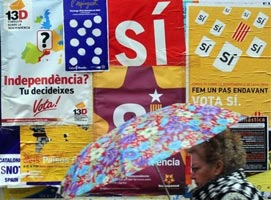7 January 2010 Edition
Catalan towns vote for independence

A woman walks past posters calling for the independence of Catalonia
THE movement in support of Catalan independence received a powerful boost last month when residents in 167 towns and villages voted overwhelmingly for a “social, democratic and independent Catalan state” in symbolic referenda.Although the poll, held on 13 December, was non-binding, the massive ‘Yes’ vote by hundreds of thousands of people – 94% of those who voted – reflects the growing support at all levels of Catalan society for independence from Spain.
Areas that voted represented about 15% of Catalonia, a nation of 11 million people, and voter turnout was about 30%.
The towns that had organised the poll did so despite Madrid’s opposition, which the Government tried to portray as scornful indifference. The poll followed a similar non-binding referendum held on 13 September in the small town of Arenys de Munt, home to 8,000 people.
Speaking to An Phoblacht this week about the September vote, Catalan independence activist Lluís Sales i Favà said:
“More than an isolated event, the Arenys referendum gives us some clues on the current Catalan atmosphere. Many political commentators have cited it as part of the death throes of the current political system.”
PAVING THE WAY
The Arenys de Munt vote attracted international media attention and provided the inspiration for December’s coordinated poll of towns and villages.
Organisers said they were paving the way for a nationwide referendum on independence in the future.
The December vote happened as the Spanish state’s constitutional court prepared to rule on a charter of autonomy which increased the Catalan regional government’s powers in 2006. The Spanish unionist, right-wing Partido Popular lodged an appeal against the charter as “unconstitutional” because it defines Catalonia as a nation.
Lluís Sales i Favà said that a new grassroots movement in favour of independence was on the rise as a result of the “legal dead end” of the Spanish Constitution.
“‘Franco died in bed’, a popular saying here, means that, until his last days, the Spanish dictator had time to settle a new political regime as his legacy. What came out of this process, the so-called Transition, was the conversion of a fascist dictatorship into a parliamentary monarchy.
“Later on, the new regime began transferring limited autonomous power to all regions, including those historical nationalities within the state (Galicia, the Basque Country and Catalonia). But the legal incapacity to gain any more autonomy has fuelled the growth of independentism across all layers of society.
“The Catalans are finding their own way out.”
